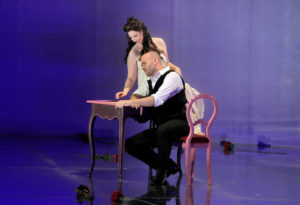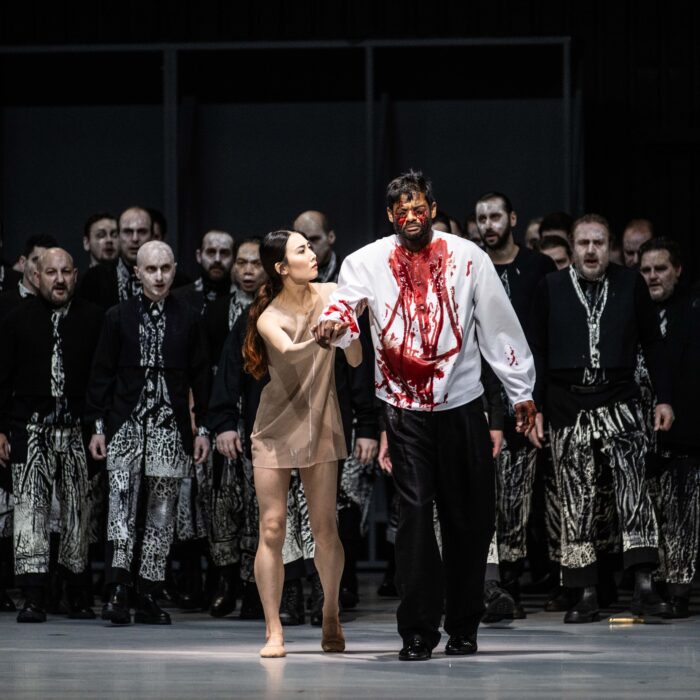
San Francisco Opera 2017-18 Review – Manon: Michael Fabiano & Ellie Dehn Lead Solid Production of Massenet Masterwork
By Lois SilversteinWhen you come right down to it – French Grand Opera – is very grand. A large canvas, huge sets, wide-ranging costumes, display of various kinds, sweeping music, on occasion, and musical textures that vary and offer range of interest – plus human beings, who, set into this panorama – resume their rightful size: ordinary. What? We control our own destiny? Not a chance.
In German opera, and, often in Lieder, “Schicksal” – fate – is what we come upon when we stand hopeless and helpless; when all the time we thought we were master-mistresses of our destiny, we discover that it ain’t necessarily so, if at all. When we come upon the young Manon set down by coach in Paris, pink suitcase in hand, matching petticoat and accessories, not only does she seem more than excited – her first aria, “j’ etourdis…” – captures not only her enthusiasm but her cockiness: indeed she might at the least imbibe all that she sees. Only Manon, doesn’t merely flirt with what attracts her, she goes after it, and, only after, maybe not until the end of the opera does she reconcile herself to her particular “destiny.” Character and action driven, yes, but our Manon, Ellie Dehn, in conjunction with what is happening all around her – the powers of family, men, money, human desire –intertwine in a mesh that is trap and opportunity. She admits in Act one, to her Des Grieux, played by tenor Michael Fabiano, her lust for the diamonds of human craving – money, beauty, clothes, power, admiration, as well as her desire for him. This shows us that she is already more than an active participant in what is yet to unfold, rather than mistress of it. Is that why she disappears in the SFO production at the finale? And Des Grieux is left holding an empty blanket/cloak? Was Massenet Buddhist? Is Vincent Boussard, the Director?
Themes Galore
SFO’s production feasts on the themes. From the curved ramp that becomes both entrance and stand for Paris landscape, borderland of the lovers’ room and the gambling casino, as well as no-where land where the sorrowful finale occurs. A perfect macrocosm in which the lovers carve out their romance. The production by Vincent LeMaire, with its stage right and left mirrors, underscore the multiple story views – young love, yes, but the guiding hand of both society and the times. Costumes, also by Vincent Broussard, drawn from various era, lights, by Gary Marder, the rise and fall of objects – a baroque statue of Christ in the church of Saint Sulpice, clusters of multi-colored balloons along the boulevard, along with the prima donna herself descending and kicking off her shoes to the first-comers, emphasize these alternating views. An apt choice, too, since the story of protecting family honor flouted by the ardent lovers sets the opera itself in a larger context.
It, in a broader context, is perhaps more appropriate to our own times. “La belle epoque” mingled with today’s world, filled as it is by tumult and trial dotted with shopping bags of colorful paper gifts, no doubt, spinning dice, coins, jewelry – display the endless and prevailing greed. “Radix malorum est cupiditas” – Greed is the root of all evil only looks festive. By the Act five finale, such appeal shrinks into darkness, the young couple huddled together left with none of that. Not only love and desire lost, but life itself.
Lush and Expansive
Massenet’s score for “Manon” is a lush embroidery of texture and color. From fife and drum beats to a solid range of winds and strings, Massenet leads us across the streets, drawing rooms, garrets, churches, and gambling halls, and nowhere lanes of Paris, providing the arc of moods – reflection, melancholy, fun, and delicatessen of his music and French opera. When we hear Manon’s exquisite aria, “Adieu, mon petite table,” or Des Grieux’s “Fuyez douce image,” we dip into their memories ; in Des Grieux’s vision of the cottage in the woods for the lovers, we bathe in a beautiful dream. All ultimately disappears.
Even the motivic melodic line that is their love theme, is no Wagnerian amplification and thrilling multiplication of layering, human, historical or cosmic. Instead, here, then gone, simple and occasionally with sweep, ascending and descending arpeggios taking us through the tale. Conductor, Patrick Fournillier makes fine use of the 62-piece orchestra, rich with winds and strings, never submerging even the smallest triangle cling in the full panoply. Pleasure and pain trembling throughout, displayed and felt. The well-known resonance of the organ in the Saint Sulpice aria, as well as the gavotte and other dance rhythms, gives more than a good taste of Massenet’s range.
Young and Eager
Singers in this production were young and eager. Ellie Dehn, fresh from her performance as the other well-known coquette, Musetta, in “La Bohème”, took on this Manon with verve, ample gestural detail, facial expression, and vocal technique. Her “Adieu, mon petite table,” floated from her with lovely grace. Here was a time in the performance when what she was singing about and how she sang were particularly well unified. We felt her loss, even more than the conflict she faced. Otherwise we would not care at all; and that was not true.
That Dehn’s Manon didn’t always embody this depth of character coupled with the pastiche of the storyline might not bother some who savor all the rest of such a full performance. Then too, she hit all her top notes, if with some strain and occasional shrillness. Again, in the midst of all she has to do – from young girl, to more glittering lady of the night, gold-digger – according to the male-mind – faithful-unfaithful lover – it is more than easy to forgive those.
So too, Michael Fabiano’s Des Grieux, which, although his highs were indeed high, and mostly, solid and resounding, making Fabiano’s sure claim to the role, he did lurch and stagger too much when depicting distress. Frowns too, and sneers, distracted from ardent lover credibility. More cultivation of his emotional range will probably emerge in the future. His rise on the international opera scene only invites more opportunity for deeper emotional conviction – i.e., staring into his lover’s eyes, pain and anguish at his father’s chastisement – in this particular performance were not quite there yet. Both the leads often perform rather than embody their roles; here are exceptionally talented but as yet like somewhat moving cutouts looking for their true “performer-persona.” For example, Fabiano’s pianissimi felt more contrived than qualitative shifts in feeling and care. In time, no doubt they will come.
James Creswell’s beautiful and rich baritone lent a worthy dimension to the vocal beauty of the main performers. By directly gazing at the son he praises or admonishes, for instance, however, could deepen his conviction. Yes, here is a Germont-variant of father, but without the full weight of Verdi’s portrait. One thing we get from a good Germont is the conviction he is doing the right thing; Des Grieux Senior sings these admonitions all right, but without that. Still, his rich voice was a welcome addition.
Lescaut (David Pershall), Guillot (Robert Brubaker), and De Brétigny (Timothy Mix), had much to do to further the plot. Despite the unevenness of singing and projection in some of the duets and brief solos, we appreciate their quick movement, gesture, vocal energies, and presence linking the various narrative elements. So too, Pousette (Monica Dewey), Javotte (Laura Krumm), Rosette (Renée Rapier), whose many shifts in mood, tone, costume, style, provided a quasi-chorus-like dimension to the show. Effect, was what Massenet was after, and his music brought it to bear. So too, the chorus, well-directed by Ian Robertson, showcased sung aptly and was present without becoming a distracting presence. Indeed they fleshed out the scenes. So too, the cameo appearance of the Innkeeper early in Act one.
Manon, lovely child of a time that is no more, brings us all to the brink of regret for what as humans we need not regret. What we want we want, like it or not, and the circumstances that bring us to claim and act on them will be as they will. To be awake to them is the key, rather than reproach. To offset them with acceptance of our human vulnerability is what we leave the opera house with; no heavy-handed punishment required, from friend or foe. When Manon disappears in the cloak-blanket of Des Grieux, and he stands up without her, we just hope she isn’t hurt by her roll offstage.


